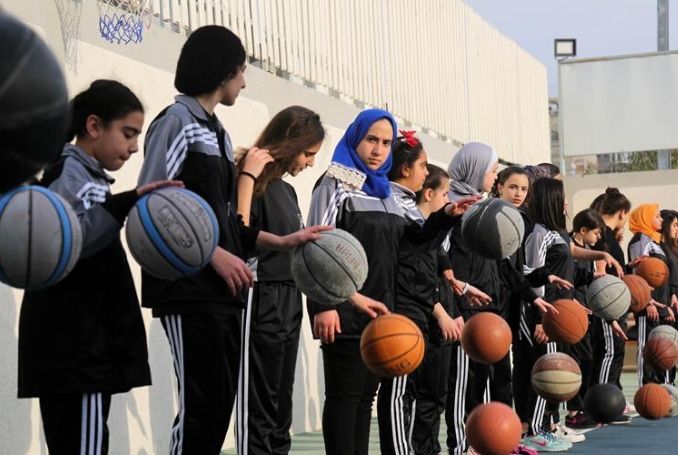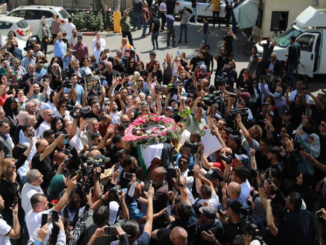
By Marion Kawas
The Canadian BDS Coalition issued a statement on October 22, 2019, declaring victory in the campaign to stop the NBA 2019 champions, the Toronto Raptors, from going as a team on a “promised trip” to Israel.
The Coalition noted that the new 2019-20 National Basketball Association NBA season has officially started, and “no reported public team visit” to Israel has occurred.
Hurray! Thanks to the Canadian BDS Coalition's #RaptorsDontGo campaign, Canadian basketball team Toronto Raptors have not gone on a celebratory trip to Israel: "“no reported public team visit” to Israel has occurred." #BDS https://t.co/JXAY2Yty41 pic.twitter.com/HIgiTHu9Oq
— CJPME (@CJPME) October 24, 2019
Their release stated:
“Our campaign was launched in June 2019, immediately following the Raptors victory in the NBA championship; and after team co-owner Larry Tanenbaum received extensive coverage in the Israeli media stating he would bring the team to visit Israel if they won the championship. The Israeli Embassy in Ottawa highlighted the issue, and tweeted the Raptors promising ‘we’ll call you…to help with the arrangements.”
The outreach and strength of the #RaptorsDontGo campaign exceeded even the organizers’ expectations; the reaction was immediate, loud and global. The blatant nature of this particular sportswashing attempt was so crude and so exploitative that it seemed to outrage a wide swath of people.
Congrats to all who worked on the #RaptorsDontGo campaign! https://t.co/5QUBkXxdwc
— Adalah-NY (@AdalahNY) October 23, 2019
Roger Waters took time off from his schedule in New York to do up a video message adding his voice to the #RaptorsDontGo campaign, a message that was later slammed in a tweet by Israel’s Ministry of Strategic Affairs. This was not the first tweet from Gilad Erdan’s ministry on this subject; they also tweeted on June 18, 2019, telling the Raptors “We’re looking forward to your visit to Israel”.
The campaign activists also explained in the statement why they felt the trip had not happened. “Why exactly the Raptors team never went on the “promised trip” may have been the result of several factors, not the least of which was the quick and overwhelmingly negative response by so many basketball fans.
This must surely have been noticed by the team’s owners – Bell 37.5%, Rogers 37.5% and Tanenbaum’s company Kilmer Sports 25%. Although Tanenbaum’s entity may not be impacted by public opinion on this issue, Bell and Rogers certainly are and have their broader business agenda to consider.
Also, the protests that happened in Israel after the police shooting of an Ethiopian teenager on June 30, 2019, some referencing slogans of the Black Lives Matter movement, would have been a politically damaging backdrop for such a team visit.”
The public backlash was a definite factor. And the protests mentioned in the statement that happened in Israel after the shooting of an Ethiopian teenage were definitely what analysts would term “bad optics”.
Especially for a team of majority-black players, some of whom had been vocal about their refusal to visit Trump’s White House in opposition to policies affecting black communities in the U.S. Further, the Raptors team had other internal issues to focus on, such as rebuilding the team after losing some top players, and may not have savoured the prospect of having to do damage control for an unpopular trip to Israel.
Activists declare victory in #RaptorsDontGo campaign – #mba #cdnpoli #uspoli #ukpoli #giletsjaunes #chicago #newyork #boston #miami #texas #nfl #nhl #nba #mlb #fifa #olympics #bds https://t.co/uNgrMQbWVX
— deva ramkelawan (@DevaRamkelawan) October 24, 2019
In an interesting development that got wide media attention and favorable social media response, the Raptors team last month were the first NBA team to introduce a new line of team-branded athletic hijabs for Muslim women.
According to CBC:
“The Toronto Raptors say a new line of team-branded hijabs is part of a broader effort to be more inclusive to fans of all cultures. The team’s parent company, Maple Leaf Sports and Entertainment, unveiled the Nike Pro hijabs emblazoned with the team logo in a social media post…”.
The same article goes on to quote MLSE Senior Marketing Director Jerry Ferguson as saying that “the Raptors want to send a message of inclusion to its widely diverse fan base, which grew substantially during the playoff run that saw the team win its first NBA championship earlier this year.”
Of course, something that facilitates the active involvement of more women, especially younger women, in sports is a positive development. But one wonders if the desire of the Raptors management to showcase a “message of inclusion” was also an effort to balance the fallout of the Israel trip fiasco.
The outreach and strength of the #RaptorsDontGo campaign exceeded even the organizers’ expectations; the reaction was immediate, loud and global. – @Canadian_BDS https://t.co/a1wbKABj3t
— BDS South Africa (@BDSsouthafrica) October 24, 2019
Last month, the Portland Trail Blazers announced that they would no longer partner with an Oregon-based company that supplies the Israel Defense Forces (IDF) with rifle scopes. Activists had engaged in a year-long campaign calling for the end of this partnership; not surprisingly, the Blazers denied that the campaign had anything to do with the decision. Rather, they stated that the partner company, Leupold and Stevens, took the initiative to not renew the contract and it was all “business-related”.
The Toronto Raptors, if they respond at all, will probably offer a similar “business-related” explanation. But then, outrage by fans who buy your tickets and merchandise, and feel strongly enough about an issue to change their purchasing behavior, could certainly fall in the category of being business-related.
Bravo: "The Canadian BDS Coalition is grateful that this visit did not materialize, as it would have given legitimacy to Israel’s war crimes. We feel the #RaptorsDontGo campaign also demonstrated the strength of popular grassroots campaigns that can mobilize to achieve justice.." https://t.co/OYIRr64pZf
— osiris322 (@osiris322) October 24, 2019
The release from the Coalition concluded this way:
“The Canadian BDS Coalition is grateful that this visit did not materialize, as it would have given legitimacy to Israel’s war crimes. We feel the #RaptorsDontGo campaign also demonstrated the strength of popular grassroots campaigns that can mobilize to achieve justice for Palestinians. As with the Boycott Puma campaign, that calls out that company’s sponsorship of the Israeli Football Association which includes teams from the illegal settlements, the push-back on sportswashing of Israel’s dispossession of a whole nation and people is a critical part of the struggle for Palestinian rights.”
– Marion Kawas is a member of the Canada Palestine Association and co-host of Voice of Palestine. She contributed this article to PalestineChronicle.com. Visit: www.cpavancouver.org.








And just as a reminder, the majority of Canadian citizens support equal rights for Palestinians. It is the government and some big businesses – usually associated the military and ‘security’ – who actively support Israel’s militarized society.